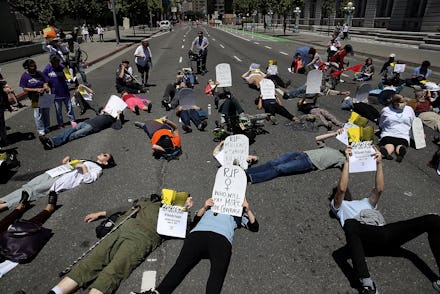Groups spending millions to defeat Senate health care bill: "We win or lose over the next week"

MoveOn.org is working to drive 10,000 phone calls to the offices of six senators. A progressive health care group is funding ads that detail how Medicaid cuts would result in reduced care for elderly Americans in their homes. The Democratic Senatorial Campaign Committee is running hyper-targeted ads on Google to highlight the connection between vulnerable Republican senators and the Senate health care bill.
These tactics and others are part of more than $10 million the Democratic party, progressive groups and trade organizations will spend in the next week to fight the bill, which Republican leaders say will go to a vote sometime next week.
That means opposition groups are relying on TV ads, protests, phone calls and more to pressure fewer than 10 Republican senators who are considered the most likely to oppose the GOP plan. Four Republicans are already publicly opposed to the bill, though they represent a conservative wing progressives cannot hope to convince. Sen. Dean Heller (R-Nev.) said Friday he does not support the current bill, making him the fifth Republican to come out against it.
Heller is a top target of these efforts, along with Sens. Susan Collins (R-Maine) and Lisa Murkowski (R-Alaska). All three have expressed concerns with the health care proposal unveiled Thursday, which would cut Medicaid, defund Planned Parenthood and make health care more expensive for older Americans.
"The core mission is to make this horrible bill so politically toxic that the GOP coalition behind it falls apart," said Ben Wikler, Washington, D.C., director for MoveOn. Wikler said his organization's volunteers are texting all MoveOn members and asking them to call their senators about the bill. He estimated MoveOn will drive 10,000 calls from constituents over the next week.
MoveOn is also organizing a "Don't Take Away Our Health Care" bus tour with Sen. Bernie Sanders (I-Vt.) The tour this weekend will take Sanders to West Virginia, Ohio and Pennsylvania — states that have expanded Medicaid and Republican senators who have concerns with the Senate bill.
Save My Care, a group supported by more than two dozen pro-Affordable Care Act organizations, has already spent millions on advertising to defend the law. Meaghan Smith, the group's spokeswoman, said the group will continue to spend heavily through next week.
The Democratic Senatorial Campaign Committee, aware of the drag the Senate bill could have on vulnerable Republicans in 2020, is targeting women, swing and older voters in Arizona, Florida, Nevada and Texas with Google and YouTube ads. The approach targets "cord-cutters" in states where Republicans like Heller and Sen. Jeff Flake (R-Ariz.) are expected to face tough re-election bids in 2018, DSCC spokesperson David Berstein said.
"We are seeing an incredible amount of engagement online around the health care issue," Bergstein said. "Voters ... understand the Republican plan will directly impact them."
The DSCC is not alone in targeting Flake and Heller. The Hill reported Friday that two progressive organizations purchased a "six-figure ad buy" in Arizona and Nevada.
Those senators have also drawn the attention of AARP, which is concerned the bill's Medicaid cuts would decrease access to nursing home and in-home health care for older Americans. AARP is running radio ads in seven states and TV ads in eight states, spending millions of dollars on its own.
The impact of the bill on older Americans is also fueling Community Catalyst Action Fund's radio and Facebook ads. The six-figure ad buy in Alaska, Maine, Nevada and West Virginia highlights the Senate bill's $880 billion cut to Medicaid by 2026. That means the two-thirds of Americans in nursing homes who rely on Medicaid, for example, may be unable to have their care paid for.
"The core mission is to make this horrible bill so politically toxic that the GOP coalition behind it falls apart."
Historically, voters 65 years and older turnout at the highest levels between midterm and presidential elections. That means, given the focus on health care, convincing that older constituency will be a major theme in 2018.
Community Catalyst is spending another $1 million on television ads in those four states, said Michael Miller, the group's director of strategic policy. "Arguably, you made it worse [for older Americans]," Miller said of the Senate bill compared to the House's version.
On the grassroots side, Indivisible, a national network that resists President Donald Trump's agenda, is applying an all-hands approach to fighting the bill, the group's policy director Angel Padilla said. Indivisible members are receiving daily call scripts to pressure Republican senators and governors in key states. Members are staging sit-ins in Senate offices. The network launched OurAmendments.org to give Democrats a way to stall debate of the health care bill next week. Indivisible has an entire guide devoted to fighting the bill's passage.
The group has also been applying pressure to Democrats, saying they need to do more than publicly oppose the bill. "This is the moment when you have to do everything you can to stop this," Padilla said. "We've been hearing Republicans talk about repeal for seven years. It comes down to these next seven days.
"We win or lose over the next week. This is the moment."